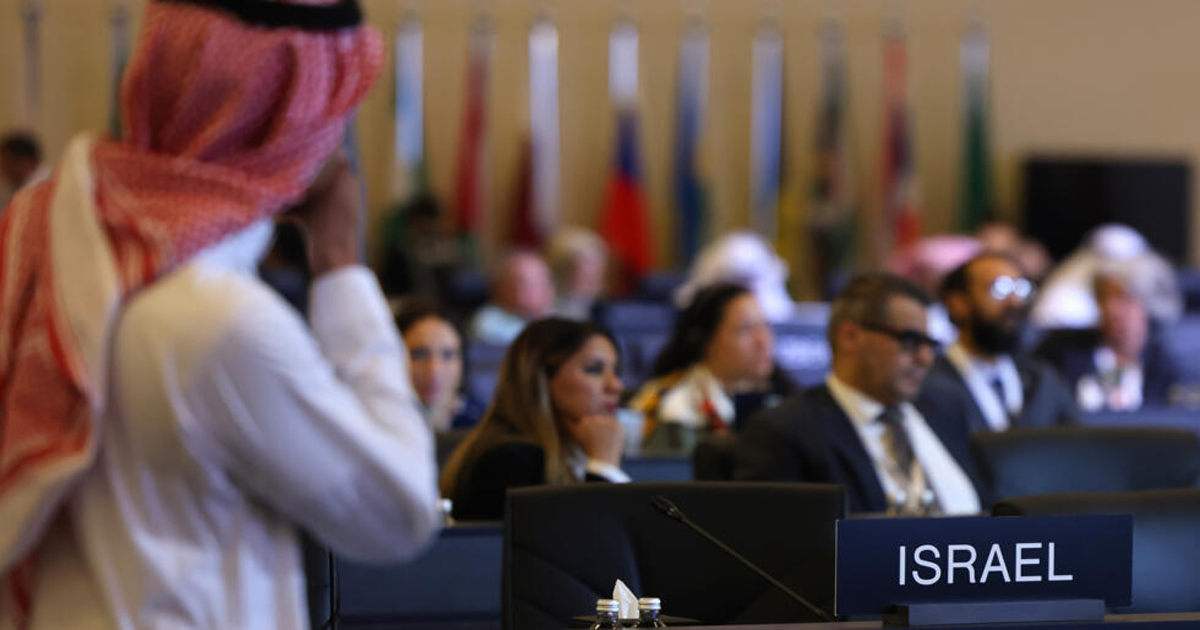An Israeli official told AFP that the five-person group arrived on Sunday for the meeting to update the UNESCO list of cultural and historic monuments.
Israeli delegation first visit to Saudi Arabia: Given the sensitivity of the visit, the official, who wished to remain unnamed, remarked during the meeting, “We are glad to be here; it’s a good first step.
“We thank the Saudi government and UNESCO,”
The crew arrived on Sunday after travelling via Dubai because there are no planes that connect Israel and Saudi Arabia directly, according to the official.
The educational, scientific, and cultural organisation of the United Nations, UNESCO, provided them with their visas.
The team, which included a security official, attended the UNESCO meeting on Monday while seated behind a desk with the word “Israel” written across it.
The official described the visit as “very good — they treat us very well.”
Saudis working at the meeting, where more than 50 sites are vying to be added to the coveted global heritage list, were staring at the “Israel” sign.
“That is God’s instruction. When queried about the Israeli delegation, a young Saudi guy working in the support services responded, “The issue is bigger than us and we can’t object to it.
Obstacles still exist.
UNESCO director-general Audrey Azoulay, according to a diplomat, played a key role in ensuring Israel’s attendance in Riyadh.
The diplomat, who wished to remain unnamed, said: “It’s the outcome of Audrey Azoulay’s work over many years to establish, in the heart of UNESCO, the conditions for a dialogue between all the states of the region.”
While there is little overt political significance to the visit, there are increasing rumours that there will be efforts to improve relations between the two nations.
A Palestinian group reportedly travelled to Riyadh last week to explore the next steps in the event that Saudi Arabia and Israel decide to establish diplomatic ties.
Saudi Arabia, home to two of Islam’s holiest sites, does not recognize Israel and did not sign the 2020 Abraham Accords, which the US mediated and led to Israel establishing relations with Bahrain and the United Arab Emirates.
In recent months, Saudi Arabia has made a number of historic diplomatic actions, including an unexpected rapprochement with Iran, years after the two world powers cut ties. Saudi Arabia is striving to reform and revive its oil-dependent economy.
According to Aziz Alghashian, a Saudi analyst and specialist on the bilateral relationship, the fact that the visit was organised by UNESCO implies that “obstacles” still stand in the way of Saudi-Israeli normalisation.
“Saudi Arabia’s Increasing Openness to the World: Insights on Israeli Relations and Tourism Initiatives”
According to Alghashian, “this is most likely a result of Saudi Arabia being more open to the world, which will include Israelis, rather than a result of bilateral relations between Saudi Arabia and Israel.”
According to Crown Prince Mohammed bin Salman’s Vision 2030 reform programme, Saudi officials have learned they cannot restrict anyone if they want to turn the country into a major international commercial and tourism destination, Alghashian added.
The Israelis will undoubtedly portray this as the initial step when, in reality, UNESCO was the one who made it possible. It’s not truly as a result of their diplomatic success or skill.
He compared the trip of the Israeli delegation to that of Israeli eSports athletes to the Gamers8 event this summer, which likewise required “third-party coordination” from international competition organisers.

